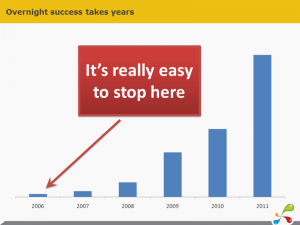Being a remote worker is not for everyone. It is simply not possible for everyone to work alone yet also be part of a team. This kind of work requires inner strength and concentration mixed with an open communicative style. It can often need multitasking skills, working on simultaneous projects or doing one task while talking to colleagues on other issues.
Work timeframes may become more flexible with long evenings or early starts, or working over the weekend. It is possible, however, to be a proactive team member, and indeed a more effective one, when not actually in the office or with the entire team each working from home.
Since our employees here at Contactually have the option for flexible hours and a few teams have remote members, we decided to tackle the often contentious topic of productively working from home or remotely!
Read on for how to work remotely & be proactive:
Personal Life Considerations
Is working from home as a remote worker within a team the right job for you? There is a sharp psychological divide between setting your own work and going out to work. Those who fail let their personal lives take over the work they should be doing or if they see working remotely as a chance to be lazy and to disrespect the urgency or quality of a job.
It can also be intensely lonely with your only communication being chatting or the odd phone call, and visit from the neighbor’s cat. Are there distractions at home like partners, family, and kids? Do you have a dedicated space allotted for work? The answers to these two questions should be no and yes respectively. That’s not to say it’s not ok to have family, but when working you need to be alone and focused. This is where the dedicated work space comes in.
Weekly Meetings & Communication
While you are working remotely, usually from home, you are still part of a team. It might seem less obvious because you are at home by yourself, but so are others who depend on you. Communicating in this manner requires a balance between keeping channels open for the betterment of the company/team, and not allowing it to be somewhere where you spend all day chatting about random topics rather than working.
Many remote workers are paid per project rather than by the hour, so this incentivises hard work rather than chitchat. Modern technology has allowed for weekly conference calls on Skype, daily work flow organization on Trello, open communication, channels, and pinning of notes on Slack, and a whole host of other platforms for work purposes.

Deadlines and Work Structures
One of the key terms for working remotely is discipline. Bear in mind the personal life considerations and a whole host of other distractions from Facebook to the contents of your fridge, the cat, and that beautiful cloud formation out of the window. You need to be disciplined as an individual with well ordered and prioritized tasks, but your team needs to be equally well organized. This means each member should be holding others to account and ensuring targets and deadlines are being met.
Real Time Data Sharing
Your work structure will be aided in part by developing technology. In addition to communication platforms, chat apps, and so on mentioned above, you have technology such as work platforms and systems, and cloud technology allowing for real time transfers of data.
This means you can share your work, photographs, images, and more instantly with whoever is shared onto the system. It also means accessing it from anywhere on almost any device so long as you have the password. This also means if you are waiting on a colleague to deliver their element, you can get on it as soon as it appears rather than waiting for an email or having to wait until you get to the office the next day.
It Comes Down to Results
Ultimately, you are going to be judged on your results as a freelance worker or as a remote member of a team (sometimes you can be both). Working remote cuts down on office promotion culture and allows you to be defined by obvious metrics and contributions rather than talking yourself up and seeming to work. Taking a remote job in a team means being ready to contribute and get the results in.
Taking Your Work with You
We started with some personal life considerations and so it is worth finishing with some too. The flexibility of working from home or remotely is extremely appealing to a good many people who do not fit into the office environ or do not find it a conducive place to do work. This is natural, but work can become an obsession and it can bleed into your world outside of work.
There is a mental shift between leaving an office, going into the real world for a bit, then coming home. Think of the doors as portals between the world of work and the world of life; a bit like how going through a door can make you forget why you went into the room – our minds reset. By working from home there is no real portal allowing the mind to reset and switch from work mode to life mode.
Technology is not helping us in this regard because portable technology allows you to work on a project from a tablet computer or smartphone while on the bus or train, or while in a café or even in your hotel room on a vacation. It’s made even worse by the fact that social media, chat apps, and so on have stopped colleagues and especially supervisors respecting the time honored tradition of respecting out of work time. If you are going to work remote, you need to be prepared for that.
Business & Finance Articles on Business 2 Community(78)
Report Post






